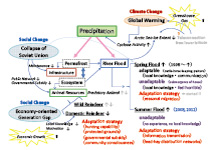Global Warming and the Human-Nature Dimension in Siberia: Social Adaptation to the Changes of the Terrestrial Ecosystem, with an Emphasis on Water Environments
- C-07
- CR①
- CR②
2015
The extent of Arctic summer sea ice has been decreasing, especially on the Eurasian continental side. Global warming is a partial cause. Cyclones have appeared frequently in summer in the region, bringing much precipitation to Siberia in particular. Meteorological data revealed high rates of summer precipitation in the upper and middle parts of the Siberian Lena River Basin from 2005 to 2008 and in 2012.
Summer river flooding around Yakutsk, capital city of the Sakha Republic of the Russian Federation, has become a problem, severely damaging local agriculture and pastoralism. River ice flooding also occurs along the Lena River in the spring, and can be severe when low winter temperatures are followed by gradually increasing spring temperatures. Such spring floods have caused severe damages to local residents living along the river in almost every year since 1998.
Our project investigated local perceptions and local governmental adaptation strategies for both spring- and summer-river flooding. Interestingly, spring flooding has been recognized as beneficial except when it causes damages to villages along the river. This is because spring floods bring nutrient-rich water to the river islands on which the farmers cultivate pastures for cattle and horses. Summer river flooding, on the contrary is seen as a hazard, because it submerges the pasture completely in summer, and prevents harvesting of hay for cattle and horses. Village relocation was one of the adaptation strategies to prevent damages from spring floods. Because local people prefer to live along the river on which their subsistence depends, they agreed, with government support, to migrate seasonally. There have been no similar adaptations to summer flooding, however. Based on our observations and analysis, we intend to promote sustainable subsistence activities in the region by proposing strategies to facilitate information transmission and improvement of feed-hay distribution networks that can aid in adaptation to spring and summer river flooding.
We also investigated how animal keepers and hunters have adapted to social-environmental changes in the region. Interviews with keepers of domesticated reindeer revealed that current climate change has not severely damaged their operations. Careful management of the microhabitats of domesticated reindeer has allowed them to successfully adapt to climate change even though they were severely affected by social changes following the collapse of the Soviet Union. We also documented the migration routes of wild reindeer, tracking them with an ARGOS satellite system, in order to understand their seasonal behavior. Similar to reindeer populations in North America and North Europe, Siberian reindeer have a summer breeding season, winter hibernating season, and other migration seasons. Because recent climate changes degrade reindeer moss in winter, the birthrate and weight of reindeer in the spring has tended to decline. Establishment of protected winter hibernating grounds would therefore help to protect wild reindeer populations. In order to preserve the practice of keeping reindeer, one of the very important subsistence activities in Siberia, governmental subsidies should be provided to keepers of reindeers and to hunters of carnivores.
We intend to inform our Russia counterparts of our analysis and recommended adaptation strategies so that they can be considered by local governments and people.

